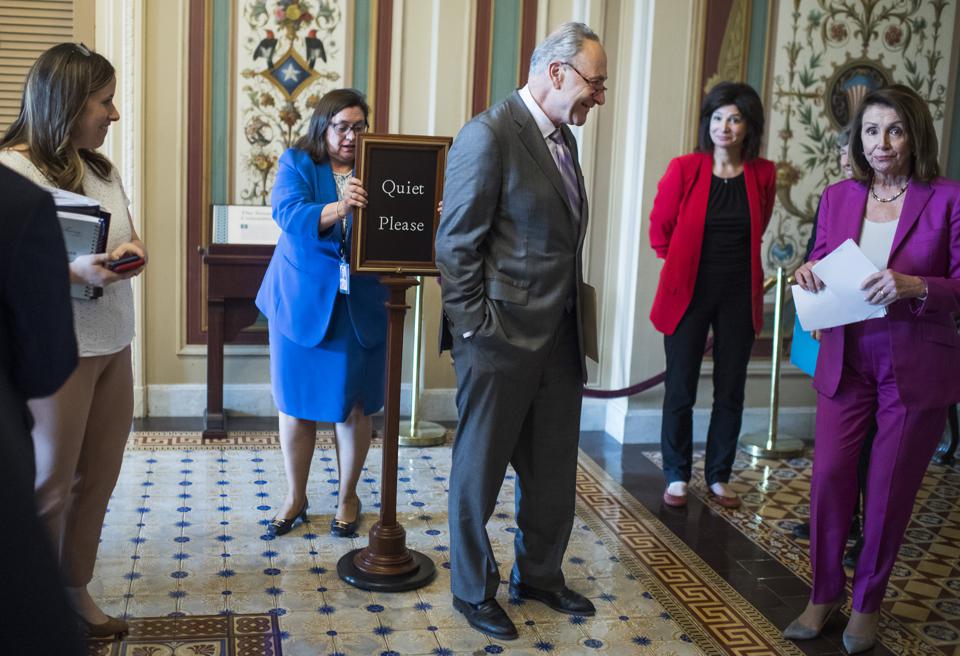

Parent advocates rally in opposition to Lily Eskelsen García
December 9, 2020
By Jeanne Allen, Founder and CEO of CER

UNITED STATES – MAY 22: Senate Minority Leader Charles Schumer, D-N.Y., Lily Eskelsen Garcia, in red, president of the National Education Association, and House Minority Leader Nancy Pelosi, D-Calif., right, prepare for a news conference in the Capitol to announce part of the Democrats’ “A Better Deal,” plan that would increase teachers’ pay and make investments in schools on May 22, 2018. (Photo By Tom Williams/CQ Roll Call) CQ-ROLL CALL, INC VIA GETTY IMAGESAs he’s filling out his cabinet, President-elect Joseph R. Biden is reportedly looking intensely at the appointment of a top union leader as his Secretary of Education. A quiet lobbying campaign has given way to an all-out push as former National Education Association (NEA) president Lily Eskelsen García made her rounds on Capitol Hill recently, including scoring a coveted Congressional Hispanic Caucus endorsement.
In addition to the support of expected allies, some unusual support has been building for the teacher-turned-union head who once complained that teachers had to care for the “tarded” and “medically-annoying.” The office of retiring U.S. Senator Lamar Alexander, himself a former Education Secretary who once said being a Governor is an ideal foundation for dealing with the challenges of multiple constituencies, is also coaching her. “We’ve talked with her and gave her advice on how to get bipartisan support,” Alexander’s long-time chief of staff David Cleary told Politico. “There’s a good argument to be made for Lily,” he said.
Many are scratching their heads at what precisely is the “good argument” to be made for Eskelsen García’s candidacy. That she is a teacher, who Mr. Biden promised to appoint? She has not been in a classroom since 1990, when she won a write-in campaign to become head of the Utah Education Association. She joined the NEA executive committee and became its treasurer in 1996. For 30 years, Eskelsen García has been a professional union leader, whose ascendency has come from being really, really good at what she does: ensuring union interests are paramount in education.
Parent advocates are rallying across social media in opposition. “Under no circumstance should anyone be considered for this position that spouts derogatory words to describe exceptional children,” said one leader, to applause of dozens more. “I can’t believe this woman is even under consideration and that this wasn’t a deal breaker,” said another.

The NEA policies pushed by Eskelsen García don’t match up with the ideas that are actually helping kids most in need. #WHATABOUTUSEskelsen García is one of the most vociferous opponents of education choice, an issue that Senator Alexander, among others, believes is vital to the nation’s future prosperity. She has compared choice for poor kids to “snake oil,” and has argued that “everything about ‘school choice’ leaves students out in the cold.” The folly in Eskelsen García’s commentary and the policies she supports, and what makes her the wrong person to lead today, is that the majority of students who are actually being educated during the pandemic are in schools of choice. In comparison to traditional public schools, more charter schools and private schools did not close permanently and have continued to successfully educate both in person and online.The NEA has for decades waged a wasteful and costly war on online education and charter schools in particular, and if their campaigns had been wholly successful, millions of children would right now, amidst the Covid pandemic, be unable to continue their education, their futures suspended indefinitely. Not only did these schools work for students and families before the pandemic, but they are providing a full service, full time education. Contrast that with the many school districts the NEA union represents, like Fairfax County, Virginia and Montgomery County, Maryland, where lack of focus and bad decision-making has resulted in massive failures in remote education. Schools in these counties remain closed because of union demands, even as officials press for reopening amidst data demonstrating the safety of in-person schooling.
Perhaps the most absurd NEA action of late that should concern even the staunchest anti-choice Biden reps is the group’s opposition to micro-schools and pandemic pods which desperate parents created to educate their children during the pandemic. The NEA has published a series of “Opposition Reports” spewing a litany of alleged offenses by microschool and pod providers, which they argue are looking to “exploit opportunities” presented by Covid. In reality, parent-led schools threaten the lock the unions have on public education. The union has indicated it will work in the next administration to put the kibosh on these parent-led schools, by ensuring that they fall under the regulatory framework that is at the core of why traditional schools do not work for most students.
The most recent indication of our national education inadequacy comes from the Trends in International Mathematics and Science Study which assesses the math and science skills of students from dozens of countries. As has become an all too familiar refrain, lower-performing U.S. fourth- and eighth-graders saw huge declines. “Between 2011 and 2019, the nation’s bottom-performing eighth graders saw scores decline 24 points in math and 27 points in science,” and even top performers, while increasing are behind other countries, including Russia and Japan.
“TIMSS also tells us that this gap between high- and low-performing students in the U.S. is consistently wider than in many other education systems — including most of the systems that outperform the U.S. on average,’ said Lynn Woodworth, the center’s commissioner.”
That data comes on the heels of research finding that a majority of students have lost ground in reading and math.
It is precisely these kinds of assessments and tests that can guide sound policymaking, but the 30-year union veteran says testing is corrupting education. It’s an irresponsible thing to say or promote, but it’s at the heart of why Eskelsen García also called on former Obama Education Secretary Arne Duncan to resign amidst demands that states test as a condition for new competitive grant monies. While debates abound about the right level and application of testing and measurement, there is little disagreement – outside the unions – that accountability for results and data to guide improvements are critical to correcting how schools operate and how students are instructed.
The reality is Lily Eskelsen García’s agenda is not about good education. As she told Salon when she first became NEA president,
“People in the progressive movement have to realize that regardless of the particular fight they are engaged in, it starts with education. Whether you’re fighting for environmental causes, women’s rights, voting rights, all of these causes – and the very foundations of democracy and how our society makes decisions – start at a schoolhouse door.”
It might come as a surprise to Lily that most parents are not sending their kids off to school to become progressives, but to be educated, with the basics and then some. Perhaps that explains in part why schools are not succeeding in delivering on that promise – they are being dominated by a school of thought that has nothing to with the most basic of educational principles – that knowledge is the foundation of civilized society. Eskelsen García’s agenda is far more problematic than even saying thoughtless things about children. Her goal – and that of the union interests in the U.S. – is about power and ideology, not about education. That is why she is lobbying so hard, and it is the key to why she should not find favor with any sitting Senator, let alone President-elect Joe Biden.Follow Jeanne on Twitter or LinkedIn or some of her other work here.
Founded in 1993, the Center for Education Reform aims to expand educational opportunities that lead to improved economic outcomes for all Americans — particularly our youth — ensuring that conditions are ripe for innovation, freedom and flexibility throughout U.S. education.

